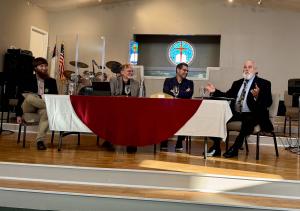“You preach a different gospel.” “Is that so? Well, your group of Christians isn’t a part of the one true Church.” “Please, both of you, calm down. You’re all going to Hell!” Do these words sound at all familiar? If you have observed nearly any theological discussion on the internet in a comments section or in a social media group—particularly ones that include individuals from different Christian traditions—you will have no doubt read or heard something quite similar to the exchange above. Indeed, in 2025, there is no shortage of people who are willing to discuss difficult theological subjects with others who reside on different sides of the confessional divide, but there does seem to be a scarcity of persons who are willing to do so charitably and for the right reasons. It is my conviction that this is largely due to the environment in which these kinds of conversations are taking place today.

It is fairly obvious that the World Wide Web isn’t the most hospitable setting for discussions that consist of opposing theological viewpoints (or any opposing viewpoints for that matter); this electronic locale hides conversation partners with various degrees of invisibility and makes it even easier for those with malicious intent to find a way to the discussion table. Because of these reasons and others, I am convinced that ecumenical discussions (those among theologians, the clergy, laity, etc.) are all better off being conducted in person. Beginning with this post and concluding in a follow-up, I will make an argument as to why in-person ecumenism is better suited than the online variety to contribute to the cause of Christian unity. But before I begin, I believe it is important to make a few distinctions.
Varieties of Online Ecumenism
There are different sorts of online ecumenical engagement, with some being worse than others. The first and most problematic is, of course, the type of discussion that is conducted in comment threads. Often, people are shrouded in partial or complete anonymity when participating in comment exchanges and are therefore free to be as hateful as they need to be to feel as though they have won the debate, whatever the theological topic may be at the time. If someone is operating under the mask of an avatar, chances are this person is unconcerned with fruitful dialogue, but is instead concerned with not sullying his or her true image with the unhelpful and often vitriolic interactions that they engage in. These masked comment crusaders cherish their ability to lob polemical grenades from the safety of their own basement bunkers, unidentified.
In contrast, there are also many instances of interdenominational dialogue in recent years that involve people who converse with one another on a video call. This is much better than the kind of discussion that I previously mentioned, yet it still has its drawbacks. For one, video dialogues are often posted online and therefore facilitate unhelpful interactions, those ecumenical comment wars that hold little worth and solidify theological misunderstandings. Secondly, while there is value in online video discussions (I want to make that clear), they still lack much of what makes face-to-face ecumenical engagement so profitable and special. It is to the positive aspects of in-person dialogue that I now turn.
Interdenominational dialogue should be conducted in person because of what sets it apart from its online analogue; when one interacts with another Christian face-to-face, they are met with two qualities that should have an immense impact on their ecumenical engagement: 1. their dialogue partner’s humanity, and 2. the reality of that person’s “Christianity.” By the latter, I mean the sincerity of a person’s faith in and service to the Lord Jesus Christ. Let’s examine both of these characteristics in detail.
The Other’s Humanity
When you dialogue with someone on the internet, you are typically aware that the one whom you are dialoguing with is an actual human being. If you weren’t, I doubt you would be as interested in engaging in a long, drawn-out discussion with them on matters that pertain to the truths of God’s revelation. Truly, a theological discussion should be a dialogue between souls because it has eternal weight—even if the discussion topic doesn’t always concern the salvation of those who are dialoguing. The notion of “playing the computer” may be welcomed in gaming, but I doubt this will ever translate meaningfully to the exchange of ideas about God (I’m looking at you, AI!). One of the primary differences then between in-person dialogue and its online counterpart, I believe, lies in the senses.
While you may grasp that the typed text or blurry face on your computer screen represents another person that exists somewhere else in the world, having a discussion with someone in a shared space forces both conversation partners to consciously and subconsciously intuit that the other is truly flesh and blood, body and soul. The humanity of the person that you are speaking with face-to-face isn’t just likely, it is tangible to the senses; it is undeniable. As a result, I am convinced that dialoguers who carry out their ecumenical discussions in person are more likely to listen and apply the golden rule to their discussion partners because, to them, those partners are more tangibly human.
It seems that on a subconscious level, individuals on the internet often confuse physical distance with theological distance and are therefore less willing to see charitable discussion as an antidote for disagreement. For these folks, the most fitting resolve is to proclaim the correct view until it has transformed their opponent. Yet, this is not dialogue; it is conquest. Until Christians are more regularly confronted with the concrete humanness of those with whom they have disagreements with, ecumenical dialogue will continue to be largely unfruitful. It is close proximity that reveals clearly in the light that we are each human beings who are made in the image of God and are worthy to be treated in the same manner that we wish to be treated.
Jesus’ Presence in the Life of the Other
It is not only an individual’s humanity that is made more evident in person, often the genuineness of their confession of faith is as well. For obvious reasons, it is impossible to really know the depths of another’s heart, but when people who love Jesus gather together, that love has a tendency to reveal itself. Testimonies are given and theological definitions are spoken, coated in a spiritual honesty that can be perceived. However, when two or more people are separated by miles, a screen, and even an avatar, their true relationship to the faith and the intent behind their words, are far less perceptible—if at all; it is so easy to misinterpret the motives behind a social media post on the Eucharist, for example, if you only have typed text to go by, without body language, and a vocal tone to accompany it.
The reality of another’s Christianness is important, not to determine who is getting into heaven and who is not, but for the cohesion of ecumenical dialogue itself. When the evidences of faith are seen in someone who is engaged in ecumenical dialogue, that person’s conversation partner ideally recognizes that the differences in theological perspective that separate the two of them aren’t because one of them lacks affection for Christ. Successful interdenominational discussion often hinges on the ability of those who are engaged in the discussion to recognize that each other are in fact Christians.
This starting point sees all parties as realizing that they share the same goal: to honor their Savior by striving after a deeper unity among believers that is rooted in truth. If a Methodist can determine that the Baptist whom they are in conversation with is one who has truly been transformed by the indwelling Spirit of God, the discussion itself transforms from a sermon declared by a believer to a lost soul, to a conversation between two partner pilgrims who are journeying together in search of the Kingdom of God.












